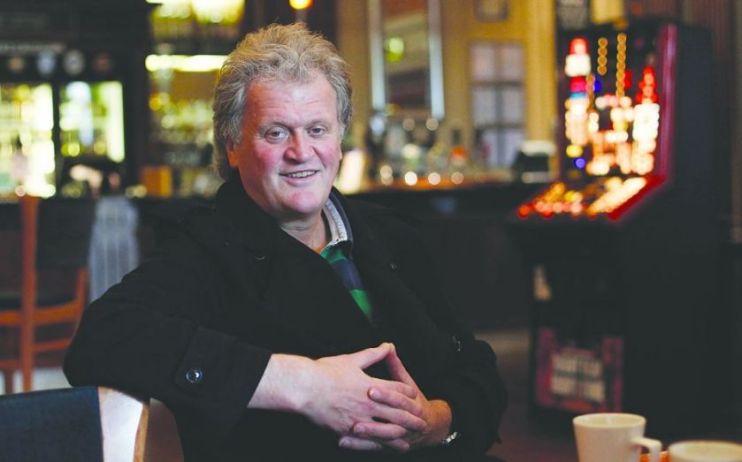Tim Martin: Wetherspoon boss on Brexit, retirement and why Gen Z are ‘closet drinkers’

Wetherspoon boss Tim Martin is eccentric, outspoken, and has built a business behemoth. Laura McGuire pulls up a barstool with the man himself at one of his heaving London pubs
Tim Martin orders a pint of Corona at every Wetherspoon pub he visits, not because it is his tipple of choice but instead because he wants to ensure the beverage is served with a slice of lime. The chain is required to provide a piece of the citrus fruit with every order. Satisfied, he immediately sends it back to the bar, so a customer can enjoy the drink for free, and grabs a cup of coffee.
Sitting across from the eccentric pub boss in his heaving Metropolitan Bar in Baker Street, I understand why caffeine is needed. His day began in Northern Ireland after a whistlestop tour of his pubs on both sides of the border. He’s squeezed in four visits to various London sites before joining me on a bar stool at 6pm.
“I try to visit at least 10 pubs a week,” he says. His Cornish summer holiday was punctuated with Corona orders.
Martin, a trained barrister, bought his first Wetherspoon pub in 1979. The oft-told tale is that he named it after a teacher who said he would never amount to anything. Today he runs more than 800 sites and has done rather well for himself. He’s also one of the country’s most outspoken entrepreneurs – famously so during the Brexit referendum, where he spoke out in favour of a leave vote and donated thousands to the campaign.
‘Brexit is a vexed issue’
Seven years on from the referendum, Martin remains forthright. “Brexit is a vexed issue and there’s probably been exaggerated claims on both sides,” he says. But he’s adamant his vote came from a belief in democracy.
“The problem with the EU is you don’t elect the presidents by universal suffrage, MEPs can’t initiate legislation, and you’ve got an unaccountable court.”
Away from Brexit, Martin moves on to another favoured topic: pubs, and the government’s tax treatment of them. The state views the sector as a “milk cow”, he reckons, because it’s such “an easy business to tax”.
In recent years, Martin has made clear his frustration at the tax disparity with supermarkets. Food is zero-rated at supermarkets; it’s 20 per cent in pubs.
Martin argues that saving allows supermarkets to sell alcohol to ‘off-trade’ consumers at lower prices, undercutting the Great British Pub. He’s slashing prices by 7.5 per cent on Thursday of this week to make the point. Does the government care about pubs? “Sort of,” Martin reckons. “For selfish reasons.”
‘I think Gen Z are closeted heavy drinkers’
Few businesses have an insight into the British consumer like Wetherspoons, from university students splitting £6.50 jugs of fruity cocktails to the rise of the craft beer drinker. Will Spoons retain its place in the heart of Britain’s cultural life? There are now plenty of studies suggesting ‘Gen Z’ – or ‘Zedders’ as Martin calls them – are ditching the booze.
Martin doesn’t totally buy the notion. “It’s the conceit of every generation that they’re different and slightly groovier than the generation that have gone before,” he explains.
On his recent visit to Dublin, he saw his city centre Wetherspoon’s packed with young adults celebrating their equivalent of A-Level exams. “I said to my pals it was just like us in 1972. I think Gen Z are closeted heavy drinkers,” he laughs.
The culture has definitely changed
Boozers or otherwise, the habits of the typical Spoons customer may have changed. Pepsi is now the best-selling draught offering and coffee is one of its top-performing drinks. That’s not necessarily bad news; both are high margin.
“The culture has definitely changed,” Martin says. “Pubs are now 50 per cent food. Thirty years ago, it was five per cent. Probably half the bar business comes from people that have a drink with their meal.”
Is retirement on the cards?
At 68, and with little more to prove, is Martin ready to step away from his frontman role? The short answer is no.
“Covid-19 took away any thoughts one might have had because it was such an intense time trying to keep the show on the road,” he said. Like all high street businesses, Wetherspoon pubs were forced to close during the pandemic, which at the time battered the group’s sales.
But over two years later the pub chain is largely back in the black, reporting record sales over the Easter period. Shares are up 50 per cent. this year; Martin himself has bought a chunk of stock recently.
These strong financial results do not appear to be enough to convince Martin to take a back seat. “I’m happy enough ploughing on working actually, as long as I can have a couple of pints in the evening and go for a walk,” he says. I think my plan is to keep going, or as my mother in law used to say, ‘if I’m spared’.”